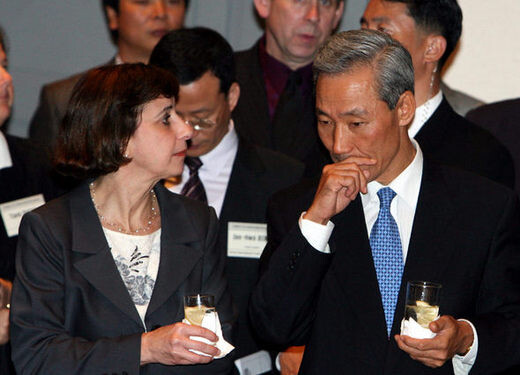hankyoreh
Links to other country sites 다른 나라 사이트 링크
Free-trade talks continue, heated

On October 25, the third day of the fourth round of free-trade negotiations between the U.S. and South Korea, the two sides continued to bring up difficult issues in a round of talks seemingly more problematic than the previous three. On October 23, the merchandise sector discussion was suspended, and on October 24, the textile sector prematurely closed, as well.
The U.S. is not giving in on core issues related to the trade of industrial products, the only sector in which Korea is expected to reap some benefit in the FTA by sticking to their position on anti-dumping regulations, the yarn-forward rule, and automotive tariffs, among others.
U.S. will not bend yarn-forward ruleSouth Korea has an upper hand in the textile industry; thus, the U.S. is interested in protecting its domestic market. The goal of Korean negotiators is to open the doors further for Korean textile goods, as in other industrial products. The obstacles it faces are tariffs and the so-called yarn-forward rule. Current U.S. regulations place special tariffs on textile products made in Korea, and under the yarn-forward rule, in order to qualify as Korean-made products, textile products must be made from Korean-manufactured yarn. In most cases, Korea imports yarn and other materials from China and other countries, so as long as this rule is in effect, there will be no actual benefit, even if the tariffs on Korea’s textile products are lifted.
As the war of nerves continued between the two negotiating sides on the matter, the textile discussion, originally scheduled to last three days, was cut to two.
U.S. concessions still more take than giveRe-opening the talks on the merchandise sector on October 24, the U.S. made a revised proposal, but the Korean negotiators were still not satisfied.
Lee Hye-min of the South Korean FTA negotiation team, said on the same day that "we had an intense discussion on the literature of the Basic Framework for Agreement and tariff cutting. We also finished the review of additional concessions on about 1,000 items the U.S. brought up in discussion yesterday." However, Lee made no comment on whether the team approved of the U.S. proposal, as there are still many issues in the proposal unacceptable to Korea, such as automobiles - South Korea’s largest export to the U.S. - being classified in the ‘undefined’ category. This means their tariff reduction has not been determined.
Korea faces the need to give something major - as in something in the area of agriculture - in order to get additional concessions from the U.S. Wendy Cutler, the chief U.S. negotiator, has been pressuring Korea to do so from the first day of this round of talks, telling the press that the U.S. expects Korea to propose their revised concessions.
U.S. stubborn on ’anti-dumping’ ruleIn the trade remedies sector, in which Korea is demanding an improvement of the U.S.’s anti-dumping policy, which aims to protect U.S. markets from an influx of cheaper foreign products, there was also no visible progress. Korea made five additional requests on top of the existing ones, but the U.S. attitude did not change.
A South Korean negotiator in this sector said, "To me, it looks like the U.S. is saying ‘Speak all you want, Korea, but I won’t give in an inch.’ " Unlike other sectors, negotiation details on trade remedies must be reported to U.S. Congress by the end of this year. So if the U.S. has a shred of intention to compromise, there has to be progress by year-end.
Korea’s agriculture proposal revisions minimalKorea had already prepared a revised proposal for the agricultural sector before the negotiation, offering the U.S. greater concessions, and made the proposal on October 25. However, the breadth of revision was not so large, leaving most of the 284 exceptions intact.
Bae Jong-ha, chief South Korean agricultural negotiator, said that "there is no difficulty in introducing special safeguards on agricultural products, but the discussion is still ongoing as to how to fine-tune the products involved and the breadth of the proposal."
Editorial・opinion
![[Column] Park Geun-hye déjà vu in Yoon Suk-yeol [Column] Park Geun-hye déjà vu in Yoon Suk-yeol](https://flexible.img.hani.co.kr/flexible/normal/500/300/imgdb/original/2024/0424/651713945113788.jpg) [Column] Park Geun-hye déjà vu in Yoon Suk-yeol
[Column] Park Geun-hye déjà vu in Yoon Suk-yeol![[Editorial] New weight of N. Korea’s nuclear threats makes dialogue all the more urgent [Editorial] New weight of N. Korea’s nuclear threats makes dialogue all the more urgent](https://flexible.img.hani.co.kr/flexible/normal/500/300/imgdb/original/2024/0424/7317139454662664.jpg) [Editorial] New weight of N. Korea’s nuclear threats makes dialogue all the more urgent
[Editorial] New weight of N. Korea’s nuclear threats makes dialogue all the more urgent- [Guest essay] The real reason Korea’s new right wants to dub Rhee a founding father
- [Column] ‘Choson’: Is it time we start referring to N. Korea in its own terms?
- [Editorial] Japan’s rewriting of history with Korea has gone too far
- [Column] The president’s questionable capacity for dialogue
- [Column] Are chaebol firms just pizza pies for families to divvy up as they please?
- [Column] Has Korea, too, crossed the Rubicon on China?
- [Correspondent’s column] In Japan’s alliance with US, echoes of its past alliances with UK
- [Editorial] Does Yoon think the Korean public is wrong?
Most viewed articles
- 1‘We must say no’: Seoul defense chief on Korean, USFK involvement in hypothetical Taiwan crisis
- 2N. Korean delegation’s trip to Iran shows how Pyongyang is leveraging ties with Moscow
- 3‘Weddingflation’ breaks the bank for Korean couples-to-be
- 4[Column] Park Geun-hye déjà vu in Yoon Suk-yeol
- 5Korea sees more deaths than births for 52nd consecutive month in February
- 6[Guest essay] The real reason Korea’s new right wants to dub Rhee a founding father
- 7[Column] The clock is ticking for Korea’s first lady
- 8[Column] Has Korea, too, crossed the Rubicon on China?
- 9Why Korea shouldn’t welcome Japan’s newly beefed up defense cooperation with US
- 10Will NewJeans end up collateral damage in internal feud at K-pop juggernaut Hybe?